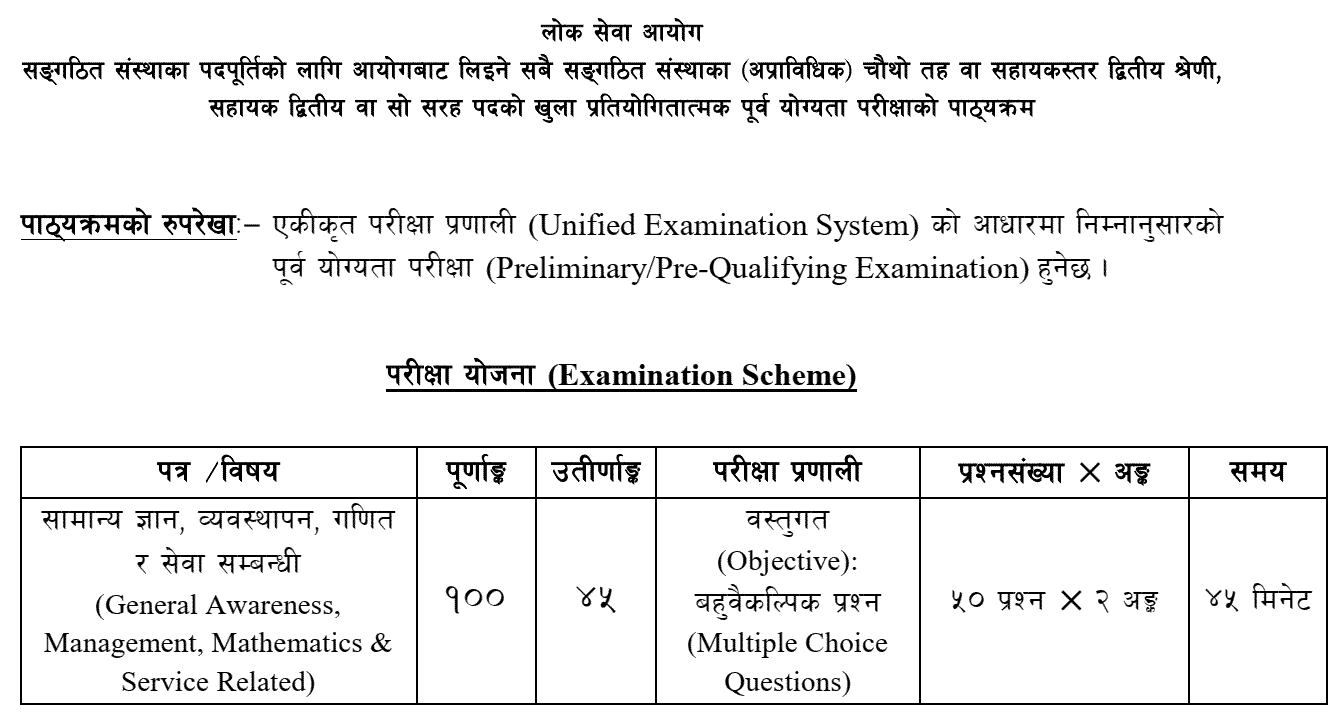
PSC Preliminary Exam Syllabus for Organized Institutions (Assistant 4th Level - Equivalent to Kharidar)
Based on the Unified Examination System, the Preliminary / Pre-Qualifying Examination will follow the structure below.
Examination Scheme
-
Paper/Subject: General Awareness, Management, Mathematics, and Service-Related Topics
-
Full Marks: 100
-
Pass Marks: 45
-
Examination System: Objective
-
Question Format: 50 Multiple Choice Questions × 2 Marks
-
Duration: 45 Minutes
Important Notes
-
The preliminary exam is mandatory for all organized institutions or more than one institution’s non-technical posts under Assistant Level Second Class or equivalent, based on the Unified Examination System.
-
The medium of the question paper can be Nepali, English, or both.
-
For each incorrect answer to a multiple-choice question, 20% of the allocated mark will be deducted. No marks will be awarded or deducted for unanswered questions.
-
The use of calculators is prohibited during the examination.
-
The number of questions, total marks, and weightage will be as prescribed under the specific paper/subject.
-
Despite any content mentioned under this syllabus structure, constitutional provisions, acts, rules, and policies amended, removed, or added within three months prior to the exam date are considered part of the syllabus.
-
Only candidates qualified in the Pre-Qualifying Exam will be eligible to appear in the Main Examination for recruitment in organized institutions through the Commission.
-
Candidates who pass the Pre-Qualifying Exam will be issued a certificate valid for one year.
Syllabus Approval Date: 2082/02/27
Paper / Subject: (General Awareness, Management, Mathematics & Service Related)
(50 MCQs × 2 Marks = 100 Marks)
1. Geography, Environment and Population (10 marks)
1.1 General knowledge about the geography of the world (continents, oceans, latitude, longitude, mountain range, rivers and lakes)
1.2 Knowledge about the geography of Nepal (geographical location, terrestrial features/topography, natural resources, climate and life)
1.3 Knowledge about environment, biodiversity, sustainable development, climate change, environmental management, population, urbanization, settlement
2. History and Culture (10 marks)
2.1 General knowledge about important historical events of the world
2.2 Knowledge about important events, social and cultural conditions in the history of Nepal (Kiranta period, Lichchhavi period, Medieval period, Modern history)
2.3 Knowledge about Nepal's social aspects including traditions, norms and values, religions, cultures, castes/ethnicities, languages, sports, arts and literature
3. Economic Aspects and Development (10 marks)
3.1 General knowledge about Nepal’s economic indicators (economic growth, gross domestic product, national income, per capita income, current accounts, balance of payment, remittance, foreign investment and foreign aid)
3.2 General knowledge about the present status of agriculture, industry, trade, tourism, transportation, communication, education, health, energy and infrastructure development in Nepal
3.3 Planned development in Nepal and long-term vision, goals, objectives and strategies of the current periodic plan
4. Governance and Constitution (10 marks)
4.1 Meaning, importance and sources of laws
4.2 Constitutional development of Nepal
4.3 The Constitution of Nepal (Parts 1 to 5 and Schedules)
4.4 Nepal’s governance system and federal, provincial and local governments
4.5 Democracy, human rights, periodic election and adult franchise
5. International Affairs and International Institutions/Organizations (10 marks)
5.1 Nepal’s relations with India, China, Britain, America, Russia, France, Japan and other SAARC countries
5.2 United Nations: Establishment, Objectives, Organs, Specialized Agencies and Activities
5.3 South Asian Association for Regional Cooperation (SAARC): Establishment, Objectives, Organs and Activities
5.4 Knowledge about BIMSTEC, ASEAN, European Union, World Bank, International Monetary Fund, Asian Development Bank, Asian Infrastructure Investment Bank, SAFTA
6. Science Technology, Public Health and Current Affairs (10 marks)
6.1 Knowledge about scientific measurement, measurement systems and units
6.2 Major scientific inventions and latest activities that have a direct impact on human life and society
6.3 General knowledge about computer and its applications, and Knowledge and communication technology
6.4 Knowledge about public health, diseases, food, nutrition, sanitation, materials used in daily life (soaps, plastics, fibers, glasses, fertilizers and pesticides)
6.5 Current events and activities of national and international importance of science technology, public health and current affairs
7. Office and Public Management (10 marks)
7.1 Office: introduction, importance, functions and types
7.2 Importance, types and means of communication in office
7.3 Office procedures: letter-correspondence, registration and dispatch, filing, circulars, orders and Tippani/memo
7.4 Records management
7.5 Knowledge related to directing, control, coordination, decision making process, motivation and leadership in public management
7.6 Meaning of public service delivery, service delivery bodies, methods and means
7.7 Public charter: importance and necessity
7.8 General introduction to E-governance system
7.9 Human values and beliefs, civic rights, duties and responsibilities and discipline
8. Applied Mathematics (10 marks)
8.1 Fundamental operations in mathematics, unitary method, fraction and decimal, percentage, ratio and proportion, profit and loss, tax and commission, simple interest and compound interest, average/mean, probability
9. Knowledge about Public Enterprises (20 marks)
9.1 Concept, development, objectives and importance of public enterprises
9.2 Classification and sectoral concept of the public enterprises in Nepal
9.3 Current status and activities of the public enterprises in Nepal
9.4 Corporate governance and corporate social responsibility (CSR)
9.5 Roles of public enterprises in economic development
9.6 Privatization and globalization of public enterprises
9.7 General knowledge about human resource management of public enterprises
9.8 General knowledge about budget, accounting system, auditing system and financial literacy
9.9 General knowledge about financial regulatory authorities of Nepal (Nepal Rastra Bank, Nepal Insurance Authority, Securities Board of Nepal)
Download 4th Level Syllabus.PDF



